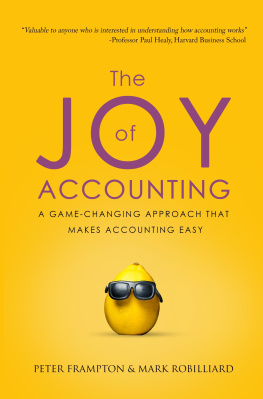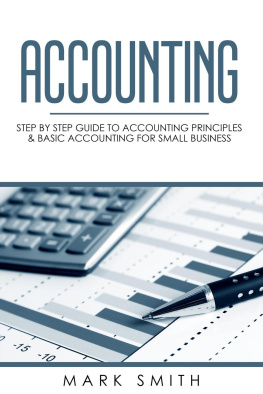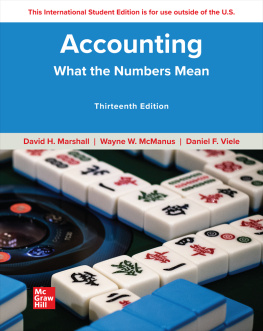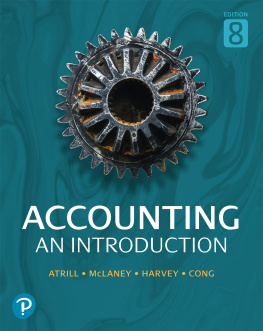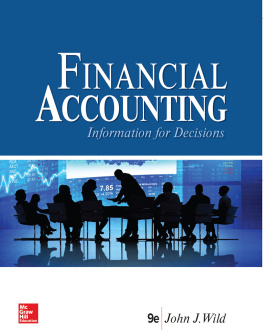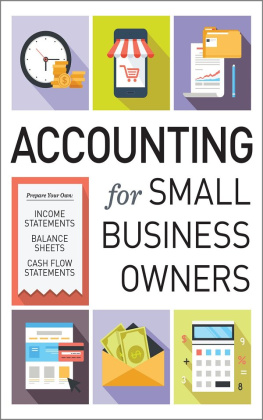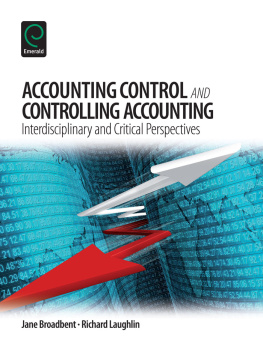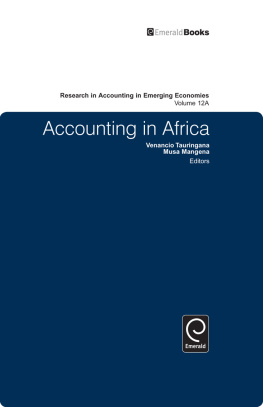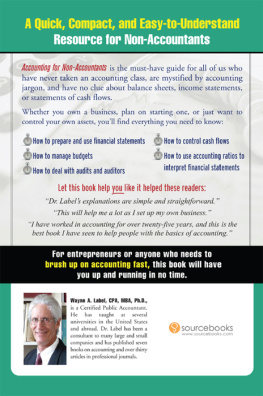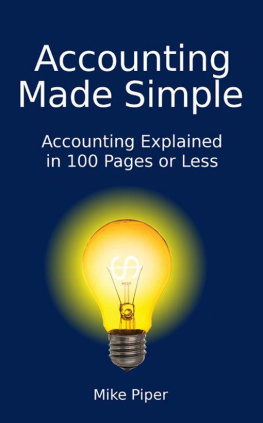The Joy of Accounting
A Game-Changing Approach that Makes Accounting Easy
Peter Frampton & Mark Robilliard
The Joy of Accounting: A Game-Changing Approach That Makes Accounting Easy
An imprint of
Wealthvox Press
Craig MacGillivray, CEO
64 New Cavendish Street, London, W1G 8TB United Kingdom
First U.S. edition September 2020
Copyright 2020 Wealthvox Limited
All rights reserved, including the right to reproduce this book or portions thereof in any form whatsoever. The Color Accounting BaSIS Framework diagram may, however, be reproduced under the terms of the Creative Commons AttributionNonCommercial-ShareAlike 4.0 International Public License creativecommons.org/licenses/by-nc-sa/4.0/
For the following opportunities, email
Bulk orders and educational school and university supplies
Remote or on-site accounting and finance workshops (see notice at end of book)
The authors are available to speak at your live event on the subject of effectiveness in personal and business finance, and financial leadership.
The contents of this book and the system upon which it is based draw on the work of numerous Color Accounting Learning System educators and partners around the world. The book is dedicated to this great family of business advocates who passionately believe theres a better way.
Authors: Peter Frampton and Mark Robilliard
Producer: Catherine Bronstein
Content Advisors: Dave Kolitz, Toby York, Adam Wilkinson
Illustration: Drew Foerster
Editing: Red to Black Editing
Layout: Jetlaunch
Publication Consultant: Stephanie Chandler
ISBN Hardcover: 978-1-7353129-1-0
ISBN Paperback: 978-1-7353129-2-7
ISBN ebook: 978-1-7353129-3-4
Rugged Green R134 G152 B116 
Bold Orange R244 G124 B39 
Royal Purple R94 G86 B165 
Contents
Foreword
Accounting has a reputation it does not deserve. Youve heard the stereotypical old tropes about accountants being boring, conservative and pedantic. Even among its academics, accounting is commonly viewed as little more than a functional skill the poor cousin of finance.
Its image, however, is a result of its extraordinary success. Accounting is ubiquitous and so deeply embedded in our lives that weve lost sight of it. Its become the water that fish will never discover. Its everywhere in your life, enabling almost everything you do, from catching a bus to building or renting your house to supporting your preferred charity to shopping and saving.
Arguably, the three most important social technologies in the history of human civilisation are literacy, numeracy, and accounting. Most surprisingly, accounting might predate the other two. Recent academic research suggests that accounting did not arise from the increasing complexity of economies, but has been present in all but the most rudimentary societies for about 10,000 years.
Double-entry bookkeeping, which is accounting perfected, is a comparatively new innovation, dating back to the 13th century, possibly earlier, and is the subject of the best-known book about accounting, Luca Paciolis Summa de arithmetica, geometria, proportioni et proportionalita, (Summary of arithmetic, geometry, proportions and proportionality), first published in 1494. Paciolis bookkeeping method uses the left and right side of a book, or ledger, to set out the double entries. This is an effective recording mechanism, but it is not an effective learning method.
Today, not much has changed, either in terms of record keeping or accounting educationI was told debit the windowcredit the door, because the window was on the left of the classroom and the door was on the right. To the teacher, however, the opposite was true, so it wasnt a satisfactory learning aid, it did nothing to explain why each entry was on a particular side, and completely useless if you found yourself in a place where the windows were on the other side of the room.
This book is different. The accounting concepts are entirely orthodox, but the methods used to teach them are novel. Peter Frampton and Mark Robilliard provide some deceptively simple twists, including using different colours instead of two sides of a ledger; and showing the complete accounting framework in a unique and memorable formwhat they call the Color Accounting BaSIS Framework. These may sound like trivial innovations, but the effects on learners are dramatic. I have been using their method in classrooms and workshops for some years and the speed of learning and depth of understanding of participants never fail to amaze me.
The essence of accounting today is no different to the system that Pacioli described, but it is not its historical longevity that makes reading this book a worthwhile investmentaccounting, and specifically double-entry bookkeeping, will never become obsolete, even when the robots take over. It is hard to see how it can be improved and, astonishingly, it is a universal technology used by individuals, communities and organisations throughout the world, regardless of their size, location, area of operation or complexity. Theres only one system to learn, and once learned you can carry it with you for the rest of your life.
Dont worrythis book will not turn you into an accountant, but it will make you accounting literate: you will feel confident to ask the right questions when using financial information. Whether you are in politics, in business, in work or just everyday life, understanding accounting gives you a voice. Not being accounting literate is like not understanding grammar. Youll get by, but you may well be limited and miss out on wonderful opportunities to be the best person you can be.
Toby York
Middlesex University, London, UK
Professor Denise Schmandt-Besserata leading authority on prehistoric clay objectshas written extensively about recordkeeping for commodities, claiming that this kind of accounting was the precondition and impetus to the invention of writing as well as abstract counting.
Introduction
Peter Frampton and Mark Robilliard
Two failed accounting students walked into a bar
Sounds like an old joke, but its not too far from the truth! Back in the 1990s, Mark and Peterby then accomplished accountants working for the worlds largest accounting firmmet and realized they shared a common conviction: there must be a better way to explain accounting.

